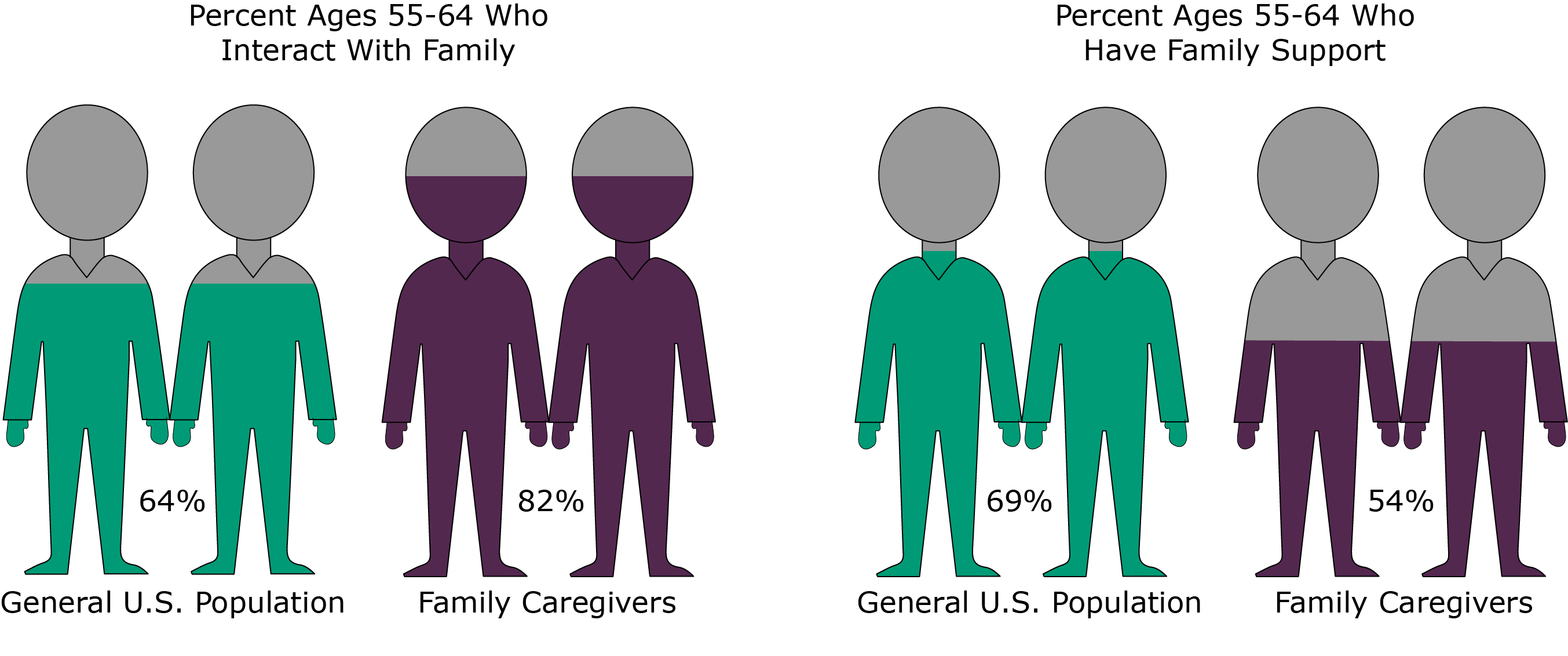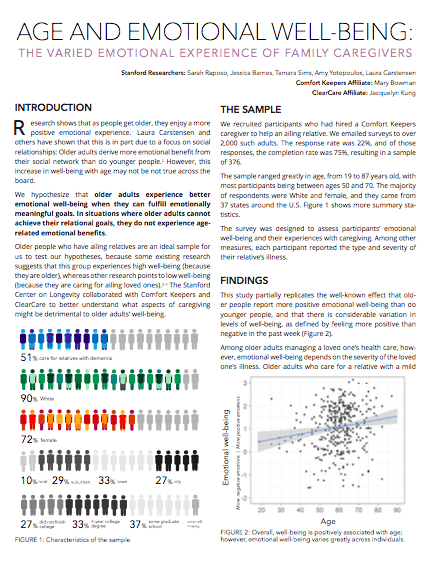
One of the most compelling findings of the initial phase of the Sightlines Project was that fewer Baby Boomers (U.S. adults ages 55-64) were socially engaged in 2012 versus 1995. There are many possible reasons for this dip, caregiving responsibilities being one of the foremost among them. To gain further insights, we surveyed 55-64 year old Americans who have a loved one that requires care and compared them to their same-aged counterparts in the general U.S. population. Family caregiver Boomers reported more frequent interactions with family and friends, but they felt less support. These findings highlight the need for aiding family caregivers in maintaining quality, but not quantity, of social interactions.
INSIGHTS INTO CAREGIVING
COMMENTARY
CARING FOR THE CAREGIVERS: THE IMMEDIATE NEED TO PROVIDE RESPITE CARE FOR A GROWING DEMOGRAPHIC
The U.S. population is aging and many spouses and adult children find themselves taking on the role of family caregiver for senior loved ones. While it’s critical that the necessary resources are put in place to care for this aging population, new research suggests that it’s equally important to consider the needs of family caregivers too. Read more

MARY BOWMAN
GLOBAL EXECUTIVE VICE PRESIDENT OF MARKETING AND COMMUNICATIONS, CK FRANCHISING INC.
COLLABORATION AND RESEARCH
In applied research, data is foundational. In this commentary, we explore the data access problems researchers face, the opportunity for public-private collaboration to advance research access, and what factors make it successful. We at ClearCare have been delighted to work with the Stanford Center on Longevity and Comfort Keepers on Sightlines research. Within most fields of research, and certainly within caregiving research, few robust data sets exist with consistency and ease of use. Two prominent ones are… Read more

DR. JACQUELYN KUNG
CO-FOUNDER, CLEARCARE
SCL AFFILIATE SPOTLIGHT
DR. DOLORES GALLAGHER THOMPSON
Professor (Research) of Psychiatry and Behavioral Science (Public Mental Health and Population Sciences), Emerita
 Dr. Dolores Gallagher Thompson works with patients diagnosed with dementia as well as their caregivers in order to study depression and anxiety disorders in these networks. She is also an experienced clinical psychologist of 25 years, though her education started with a degree in psychology and adult development at the University of Southern California, and later at the Keck School of Medicine. Her research includes work on efficacy of interventions to reduce stress in family caregivers, as well as providing programs for diverse ethnic groups including Chinese, Spanish, and Farci speakers. Currently, she is director of the Outreach, Recruitment and Education Core of the Stanford Alzheimer’s Disease Research Center. Bio
Dr. Dolores Gallagher Thompson works with patients diagnosed with dementia as well as their caregivers in order to study depression and anxiety disorders in these networks. She is also an experienced clinical psychologist of 25 years, though her education started with a degree in psychology and adult development at the University of Southern California, and later at the Keck School of Medicine. Her research includes work on efficacy of interventions to reduce stress in family caregivers, as well as providing programs for diverse ethnic groups including Chinese, Spanish, and Farci speakers. Currently, she is director of the Outreach, Recruitment and Education Core of the Stanford Alzheimer’s Disease Research Center. Bio
“More than 5 million Americans are living with Alzheimer’s Disease. And these individuals are cared for primarily by unpaid family workers. In fact, there’s about 15 million…unpaid family workers who provide 18 billion hours of care…and that’s economically valued at about 230 billion dollars.“
EXPLORE THE DATA

The positive association between age and emotional well-being is present for people whose relative has a mild illness, but not for those whose relative has a severe illness.

Participants with more severely ill relatives report more difficulty realizing their social goals than do participants with mildly ill relatives.
CONTACT US

Want to share with us your own experiences with caregiving? Do you have any questions about our research or how you could get more involved? Please feel free to contact us!
You can also sign up for our mailing list to receive more notifications about future work.


